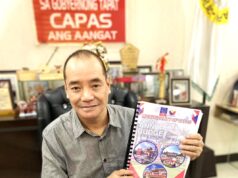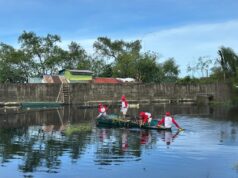LUBAO, Pampanga — The National Historical Commission of the Philippines, in collaboration with the Municipal Government of Lubao spearheaded a commemorative program on Sept. 28 to honor the 113th birth anniversary of President Diosdado P. Macapagal.
Leading the celebrations at the at the Museo at Aklatan ni Diosdado Macapagal here were guest of honor Tyrone DC. Nepomuceno, a Senior High School teacher from the University of Santo Tomas, Macapagal’s alma mater; NHCP OIC-executive director Carminda R. Arevalo, the president’s daughter Cielo Macapagal-Salgado, representing the Macapagal Family; and Vice Mayor Jay Montemayor, representing the local government.
Representatives from the Department of Education-Lubao were in attendance, offering wreaths as a tribute to the former president.
During the program, Nepomuceno shared insightful details about the life and career of Diosdado Macapagal, citing the significant contributions of the former president, shedding light on his impact on the nation and its people.
The NHCP, as the principal government agency tasked with promoting Philippine history and preserving the country’s cultural heritage, takes on the responsibility of nurturing and strengthening our people’s nationalism. Through initiatives like this commemorative program, the NHCP aims to instill a sense of pride and respect for our country’s past, ensuring its legacy is cherished by future generations.
President Diosdado Macapagal played a pivotal role in Philippine history. Born on the Sept. 28, 1910, in Lubao, he grew up to become the ninth president of the Philippines, serving from 1961 to 1965. His tenure was marked by significant reforms and policies that aimed to uplift the economic and social conditions of the Filipino people.
One of Macapagal’s notable achievements was his implementation of the Land Reform Program. This initiative sought to address the prevailing issue of land distribution in the country, ensuring equitable access to agricultural resources for farmers.
Macapagal’s land reform policies aimed to break the dominant landlord system that stifled the growth and development of the agricultural sector. His bold reforms also extended to foreign relations.
Macapagal spearheaded efforts to establish Philippine territorial claims in the international community, particularly with regard to the dispute over the South China Sea. He firmly believed in asserting the country’s sovereign rights over its territories, setting the stage for future negotiations and discussions.
Macapagal’s commitment to transparency and good governance was evident in his establishment of the first Code of Conduct and Ethical Standards for public officials. This code promoted accountability, integrity, transparency, and professionalism, creating a framework for ethical behavior within the government. Through his principled leadership, Macapagal set high standards for public officials, emphasizing the importance of ethical conduct in public service. Press release





